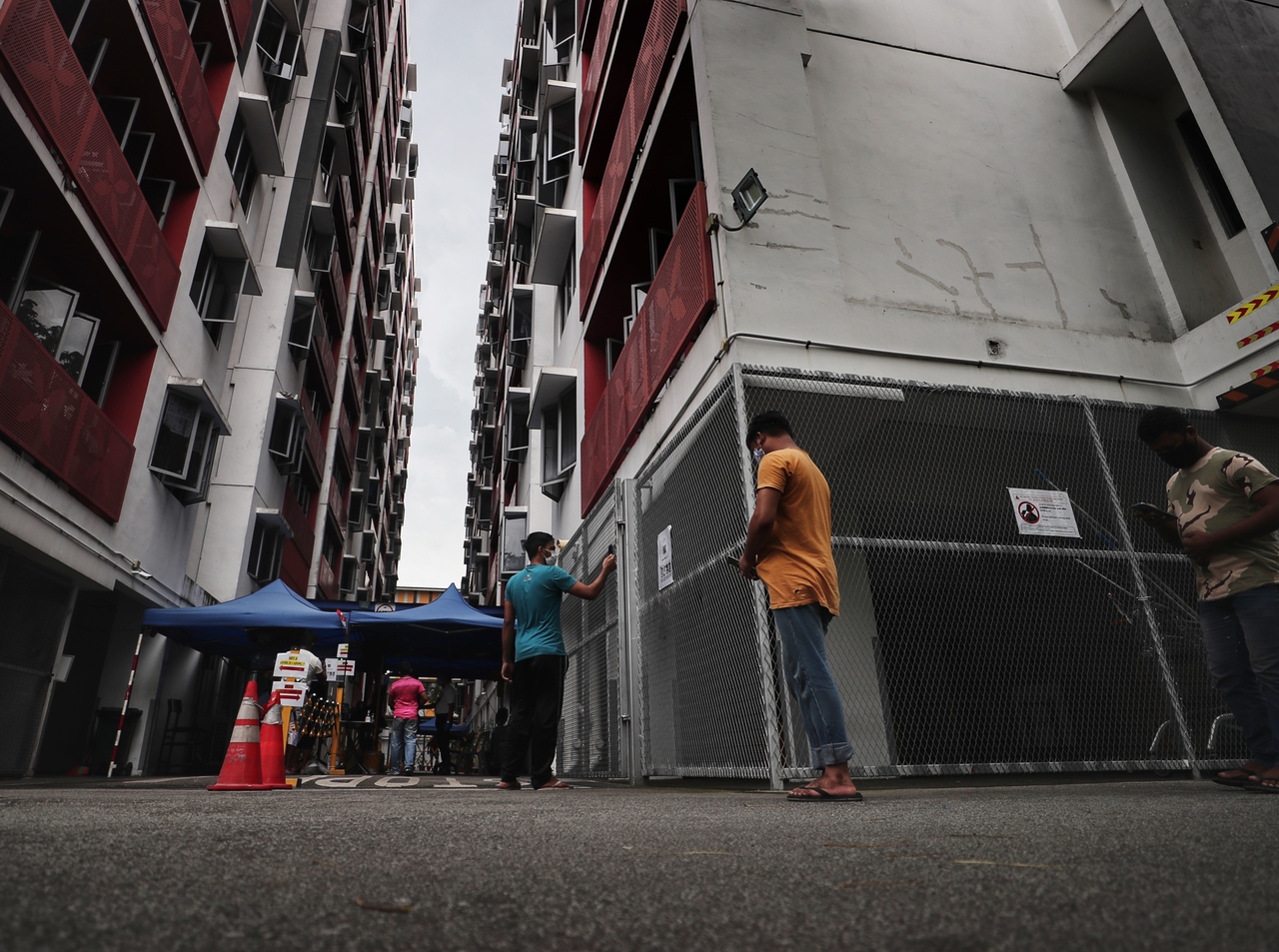Migrant workers can return to the community once a month in pilot
Sign up now: Get ST's newsletters delivered to your inbox

The pilot scheme comes after the announcement that Singapore will enter the third phase of its reopening on Dec 28, 2020.
ST PHOTO: KELVIN CHNG
SINGAPORE - Migrant workers in some dormitories will be allowed to return to the community once a month in a pilot scheme that starts in the first quarter of next year, the authorities announced on Monday (Dec 14).
This would be subject to compliance with rostered routine testing, wearing of contact tracing devices and safe living measures, said Second Minister for Manpower Tan See Leng during a multi-ministry task force press conference.
The move will also come after the distribution of contact tracing devices to more than 450,000 workers living in dormitories, or working in the construction, marine and process sectors, is completed by the end of this month.
These devices are aimed at improving the ability to isolate and ring-fence potential cases once they are detected, said a joint statement by the Ministry of Health and Ministry of Manpower.
The pilot scheme comes after the announcement by Prime Minister Lee Hsien Loong that Singapore will enter the third phase of its reopening on Dec 28.
Dr Tan said during the press conference that Singapore has made significant strides since March, when the first cases of Covid-19 infections were detected in dorms.
While the situation has now stabilised, vigilance is still needed and the necessary precautions still need to be taken, he said.
He said the progress has been made possible with the help of stakeholders such as dormitory operators, employers and non-governmental organisations.
He also credited the nearly 3,000 officers and volunteers who formed an inter-agency task force to help with curbing the virus situation in dorms, as well as the cooperation of the workers themselves.
"We could not have contained this virus without the determination, the cooperation, the patience and the understanding of the migrant workers in the dormitories," he said.
"If I may use an analogy, I think we have just reached base camp. The weeks, the months ahead, as we gradually ease these restrictions, we have to recognise that the crisis is far from over."
"We still have to scale the peak in terms of ensuring that as we open up safely, we will continue to have to implement a robust and an inclusive regime of vaccination and regular, aggressive testing for all our migrant workers, isolating and treating the affected ones, and doing aggressive contact tracing, and keeping the rest of them and the rest of us safe."
He also noted it has been about eight weeks since new infections in dorms have remained consistently very low.
As part of efforts to keep migrant workers safe and to ensure that any new cases or clusters are detected and contained quickly, the authorities will continue its "multi-layered strategy" of aggressive routine testing using both the polymerase chain reaction (PCR) and antigen rapid testing, accompanied by isolation strategies.
Meanwhile, the earliest cohort of migrant workers who have recovered from Covid-19 and are currently exempt from routine testing are being monitored to see how their antibodies change over time.
Routine testing will resume for these workers if their antibodies start to fade, or if there is evidence of reinfection among them.
"We are also building new dormitories with improved safety standards to minimise the risk of a resurgence of Covid-19 among migrant workers, and prevent new public health threats," said the ministries' joint statement.
The statement also provided an overview of the Covid-19 prevalence in dorms, which currently stands at 47 per cent. This is out of the total dormitory population of 323,000.
As at Sunday, 54,505 dormitory residents have tested positive for Covid-19 using the PCR test, it said.
Another 98,289 have tested positive in serology tests, even though they did not have a positive PCR test.

<p>ST20201008_202085766493 Kua Chee Siong/ tgswab/ Migrant workers queueing to undergoing a Oropharyngeal / Middle Turbinate swab during the swab testing operations at a Regional Screening Centre located at the Cochrane Recreation Centre in Sembawang on 8 Oct 2020. The workers at (most) dorms are tested every 14 days.</p>
PHOTO: ST
The vast majority of workers who tested PCR- or serology-positive were asymptomatic or had very mild symptoms, based on a study of workers in purpose-built dorms who tested positive as of July 25.
Only about one in five of migrant workers living in such dorms had symptoms, with the remaining displaying very mild or no symptoms.
Easing of restrictions in dorms began in November. Workers from approved dormitories can now use communal cooking facilities to cook their own food on rest days and recreational facilities such as gyms and basketball courts, subject to dorm operators' approval.
They can also visit specified recreation centres on their rest days, although the workers are still largely required to stay in their dorms except when they are going to work or running essential errands.


